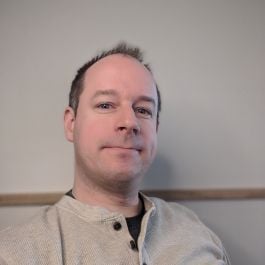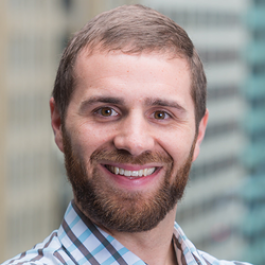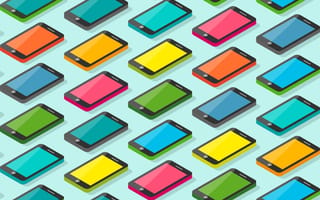The odds are that you will spend nearly nine years of your life looking at a smartphone screen, and that is a conservative estimate.
This calculation came from a 2020 survey by connectivity comparison service WhistleOut, which factored in three hours of average daily phone use. However, reliance on technology has only gone up during the coronavirus pandemic, and screen time has been climbing along with it. UnitedHealthcare's Screen Time 2020 report estimated that in the pandemic, screen time skyrocketed above 13 hours per day.
In recent years the tech industry has recognized this screen time creep and has been putting pressure on mobile developers to build apps that add real-life value for their users, and mobile developers are rising to the challenge.
What Does a Mobile App Developer Do?
Built In connected with mobile developers at innovative companies for an inside look at the future of mobile usage and how they are striving to add value as the architects of futuristic worlds in the palm of people's hands.
“There is a responsibility to make an app that is truly worthy of repeated interaction,” said Mike Sanderson, lead developer at Work & Co, a Brooklyn-based digital design and technology agency.
With that responsibility comes great power. One of the most rewarding aspects of mobile development seems to be the real-world applications of the apps, whether it’s giving amateur athletes access to pro-level tools or helping people combat homelessness.
“Our app saves lives,” said Colin Lee, senior Android engineer at Meetup, a platform that brings people together based on common interests.
Take a look at how these developers are working on the forefront of mobile possibilities.
Work & Co
Mike Sanderson
LEAD DEVELOPER

Work & Co, a Brooklyn-based digital design and technology agency, was No. 6 on Built In’s 2021 list of Best Places to Work NYC.
Tell us about a mobile app project you're working on right now.
I’m currently working on Gatorade Gx, which helps athletes track and improve their performance. By analyzing activity in three categories — training load, recovery and nutrition — it summarizes an athlete’s training progress, giving them a “Gx Score” with personalized health, hydration and recovery recommendations. Users can connect the app to Gatorade’s new sweat patch for deeper insights.
We designed the app and developed the front and back ends. We worked with the Gatorade Sports Science Institute to translate their athlete data into the algorithms that power the logic for recommendations. Previously, these insights were only for professional athletes, but now it’s being democratized.The fun part is experiencing the feeling of building something people will enjoy, and integrating it with wearable technology.
What are some of the key technologies you're using in your current work?
Apple’s HealthKit is key to Gx because of the high-quality data it provides. What is amazing about software development is that a product like HealthKit didn’t exist seven years ago, but now we’ve built a whole app that derives value from reviewing workouts and sleep cycles to make recommendations. It’s exciting to use data in ways that will help everyday athletes get one step closer to the pros!
The app also uses an image recognition framework called Vision. Using machine learning, it gathers data from the sweat patch. It’s a simple implementation of a compelling feature provided by the iOS system. Five years ago, there was no way for the app to know anything about what was under the camera. Now designers are starting to play with the possibilities.
What drew you to mobile app development, versus other types of software development?
Apps are something you take with you into the world. Websites are great, but for the most intricate experiences — using cameras, Bluetooth, Near-Field Communication or augmented reality — apps that enable everything to work together are incredibly fun. All of the things that weren’t possible to do five or ten or fifteen years ago — it’s the stuff of science fiction, and we have it at our fingertips.
Previously, these insights were for professional athletes, but now it’s being democratized.”
Discovery Direct-to-Consumer
Bill Champion
SOFTWARE DEVELOPMENT ENGINEER III

Discovery Direct-to-Consumer is the technology arm of Discovery Communications. The DTC team is driving the shift from traditional media to technology for the network.
Tell us about a mobile app project you're working on right now.
Our team is working to deliver a software development kit that functions across Discovery’s broad suite of mobile applications and connected TV experiences. The breadth of our portfolio is massive, and given our global and diverse range of consumers, we provide both internal and external requirements that represent Discovery products across a myriad of platforms around the world. As a result, our feature intake funnel is complicated and immense; we need to be able to delight our customers with a quality product that is simple to integrate. To meet this challenge our technical implementation is leading-edge and integrates with a host of different frameworks and technologies. Additionally, this is all brand-new code, written by a brand-new team.
We blaze our own path every day — there is always something new to discover and always multiple ways to creatively solve a problem.
What are some of the key technologies you're using in your current work?
Our SDK is going to be used on all iOS and Android platforms. We are a small team and we are keen to have platform-agnostic code, and a shared code base that we can update without asking customers to update.
This journey is facilitated by the React Native framework and typescript to write the code portion of our SDK. We provide a thin abstraction layer in platform-native code and deliver this framework to our customers as a binary. This is incredibly innovative — we are among the first to build an SDK using React Native. Our thin abstraction in native languages allows our clients to be agnostic to our internal implementation.
What drew you to mobile app development, versus other types of software development?
I have been an iOS developer since the day the original iOS SDK became available. I love building pixel-perfect and responsive user interfaces with terrific animations. Building for a small platform requires judicious memory use, respect for battery life, recognition of display speed limitations and striving for the best performance. All of these challenges make mobile devices the ultimate development platform.
We blaze our own path everyday — there is always something new to discover, and always multiple ways to creatively solve a problem.”
Meetup
Colin Lee
SENIOR ANDROID ENGINEER

Meetup is a platform that brings people together based on common interests.
Tell us about a mobile app project you're working on right now.
I started working on the Android app for Meetup.com about three months ago. I find it rewarding that Meetup has a direct and positive impact on the lives of our users. This is especially empowering. There are organizers who credit Meetup with saving them from homelessness or severe depression. They joined groups and found belonging in new relationships. During the pandemic, we've become a self-care outlet for some to tackle loneliness through online events. Our app saves lives.
What are some of the key technologies you're using in your current work?
Our app is about 75 percent Kotlin and will be at 100 percent soon. We're using Apollo GraphQL to improve resilience and speed when loading our new screens. We're migrating from Dagger to Dagger Hilt for dependency injection and from RxJava to Kotlin coroutines and Flow for managing threads. I'm excited that we will soon be using Kotlin Multiplatform Mobile for a new project. We have plans to adopt Jetpack Compose when it seems ready enough for the team to use.
Our architecture is mostly model-view-viewmodel. We run tests on every pull request. We run ktlint, detekt and Danger on all new code, producing static analysis suggestions to improve our code quality. We recently adopted MockK for all unit tests, which has been popular. Robolectric is a must. We run automated, end-to-end tests written using Espresso and MockWebServer on a matrix of real devices every night.
A FEW TOOLS THAT COLIN LEE, SENIOR ANDROID ENGINEER AT MEETUP, USES AT WORK:
- Glide
- Retrofit
- Moshi
- Room
- Navigation
- ViewModel
- Crashlytics
- Firebase libraries
What drew you to Android development, versus other types of software development?
I've always loved open source and the idea of controlling your own hardware. I started out as a developer writing tools to automate build, deployment and test processes. I wrote automation code by day, but wrote apps for the very first Android phone in the evenings.
What pushed me over the edge was winning the first Pearson corporate hackathon with an Android app. We attached near-field communication tags to a medical dummy to deliver a medical student exam with virtual patients using an Android tablet to tap on the NFC tags on the dummy to read vitals. For me, developing mobile apps on Android has a far better payoff. Many apps and features I've worked on get used directly by millions of people every day.
Vivid Seats
Dane Thomas
IOS ENGINEER

Vivid Seats offers an online marketplace where fans can purchase tickets to music, theater and sporting events across the country.
What have you found most rewarding about your current mobile app project?
The new version of Vivid Seats’ iOS app delivers an engaging, curated experience for consumers to discover live events. Aided by a robust recommendation engine, customers can utilize advanced filters and interactive venue maps to find the best seats at the best prices. With a smooth checkout process, which includes the industry’s only loyalty program, fans get the opportunity to enjoy live experiences with less hassle.
A challenging but rewarding aspect of this project has been continuing to modernize our codebases by implementing new technologies and current best practices. Fortunately, I was able to see how the codebase scaled in the past with a growing list of features while keeping up with the ever-changing techniques of iOS development. I am learning a great deal about how past developers solved complex problems and how to build a high-traffic app that performs at a high level now and well into the future.
What are some of the key technologies you're using in your current work?
If you have been in iOS development for the last two years, the newest technology everyone is talking about is Apple’s declarative UI framework, SwiftUI, and their reactive programming framework, Combine. Fortunately, Vivid Seats recognizes the importance of staying informed and up to date on any technology that can improve the quality of our app and developer experience. We explored using these technologies to see if they make sense in any of our upcoming features. Our proof of concept succeeded, and we have recently begun deploying code to production using these new frameworks.
As our app and team continues to grow, we are also focused on improving our continuous integration and delivery pipeline. Tools like fastlane and Bitrise are critical to that effort. They help us decrease the amount of time it takes to build our app and create reliable and repeatable pipelines that help us release iterative features as often as we like.
Discovering how a user wants to experience your app and delivering that is incredibly complex and fun to explore.”
What drew you to mobile app development, and how does it differ from other types of software development you’ve worked with?
The seed of my obsession with mobile development was planted upon the announcement of the first iPhone. I was studying to be an opera singer in college at the time, and I was transfixed by the keynote address introducing this new device. Once the App Store was born, I was determined to learn how to tell an iPhone what to do. Yet I didn’t act on this desire until about seven years later. Eventually, my time in the performance industry came to a logical end. Learning front-end development was a sensible place for me to start because I still had a connection to an audience with my work. Discovering how a user wants to experience your app and delivering that is incredibly complex and fun to explore.
I tried both web and mobile development, and I was attracted to mobile because I liked the idea of designing a user experience to be short and intuitive. You must find ways to compress the value of your app into brief interactions and give users reasons to come back. The new apps we are working on at Vivid Seats do just that.
Rally Health
Cindy Li
SENIOR SOFTWARE ENGINEER II

Rally Health aims to make it easier for people to take charge of their health. In collaboration with health plans, providers and employers, the company offers individuals personalized, data-driven healthcare information and recommendations.
Tell us about a mobile app project you're working on right now. What about this project do you find to be most rewarding or challenging?
I'm currently working on UnitedHealthcare’s mobile application. I’m a member of the platform team for the app, which means I help maintain the framework of the app as well as the releases. Other feature teams at Rally contribute code for the features that they specialize in, which creates a really cool workflow that offers us a glimpse of the work going on across the company. There's always a lot to coordinate, from onboarding teams to maintaining standards and coordinating schedules, but it's very satisfying to get to work with so many other teams.
What are some of the key technologies you're using in your current work?
My team currently uses React Native to create the Android and iOS versions of the UHC mobile app. We dabble in the native mobile ecosystem as well, since we share some code with other apps at Rally.
I like being a part of the creativity that it takes from design, product and engineering to create a performant, intuitive app.”
How does mobile app development differ from your previous work?
Before starting at Rally, I was a full-stack web developer. Yet I've really begun to enjoy working exclusively on mobile. Mobile app development teaches you how to do more with less since you're working with a smaller device. I like being a part of the creativity that it takes from design, product and engineering to create a performant, intuitive app.




